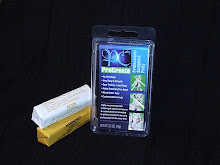Hollywood loves salesman. I've never been able to figure out exactly why, but I think it has to do with a sense of kinship actors feel they have with people who sell things. I should also point out that the reverse is not usually true; most salespeople of my acquaintance look down on actors. But there is a link: both professions are highly dependent on the appearance = reality equation, which is why Hollywood is turning to politics to further it's own ambitions.
There are many good films which feature salesman in the lead role. The Big Kahuna takes place in one hotel room as a series of salesmen try to figure out how to land a major account. The Boiler Room focuses on sham selling of bogus stocks. And then there is the seldom seen but excellent Vacuuming Completely Nude in Paradise where a driven British vacuum cleaner salesman is on a rampage to win the "salesman of the year" prize. Note that Hollywood views salesmen with a mixture of sympathy and tragedy.
And so we come to the classic Death of a Salesman play by Arthur Miller. I won't go into the play or it's many other movie variations because so much has already been written. But I finally had the opportunity to see the earliest film version and I will say it is the best. Frederic March is absolutely eerie in his portrayal of Willie Loman, the small salesman with big dreams. The rest of the cast is first rate too: Kevin McCarthy as his son Biff and Cameron Mitchell as the other son, Hap. I've seen both the 1985 version with too-much-make up Dustin Hoffman and the 1966 one with Lee J. Cobb, but this one is the best by far.
The prime difference seems to be in the director's use of sets other than the "stage" settings. When Willy Loman cracks up in a subway, it becomes far more terrifying than seeing him standing alone. Also, the final scene of Willy driving in a car with his phantasm brother leaves no doubt as to what was his intent.
I'm just surprised this version isn't very well known.
Wednesday, May 20, 2009
Tuesday, May 12, 2009
The Ghosts of Angela Webb (2005)

Regional filmmaking can be a tricky thing. For every Carnival of Souls, there are ten Yesterday Machines. And since movies are the stuff our celluloid dreams are made of, many of these local creations represent the one, ultimate chance for a lover of cinema to make his or her mark upon the world. In the days of physical film and expensive lab fees, this could be a substantial investment. There's a reason why Manos was produced by a Texas fertilizer salesman: he had the cash.
At the first Monster Mania I attended some years ago, I ran into a booth promoting a new, SOV film: The Ghosts of Angela Webb. The people were very nice and I had a pleasent conversation with Deana Enoches, the star of the film. I never did get around to watching it.
Last year I finally got my hands on a copy of the film. Let us say I urged my good friend and co-worker John to see this film. For months it became a running topic of discussion among us. I told him time and time again that he would not know True Enlightenment until experiencing The Ghosts of Angela Webb. Recently I re-established contact with John and I promised to review the movie.
Angela Web works on Wall Street. However, she's purchased a house in New Jersey. When she moves into the house, she finds it to be filled with the ghosts of those who once lived there. Many who suffered violent ends. There is one scary scene in particular where a young child, visiting the house, comes out and asks his parent why the man around back doesn't talk. The movie also ties in with 911.
A curious film. And a good example of regional filmmaking.
Subscribe to:
Comments (Atom)






